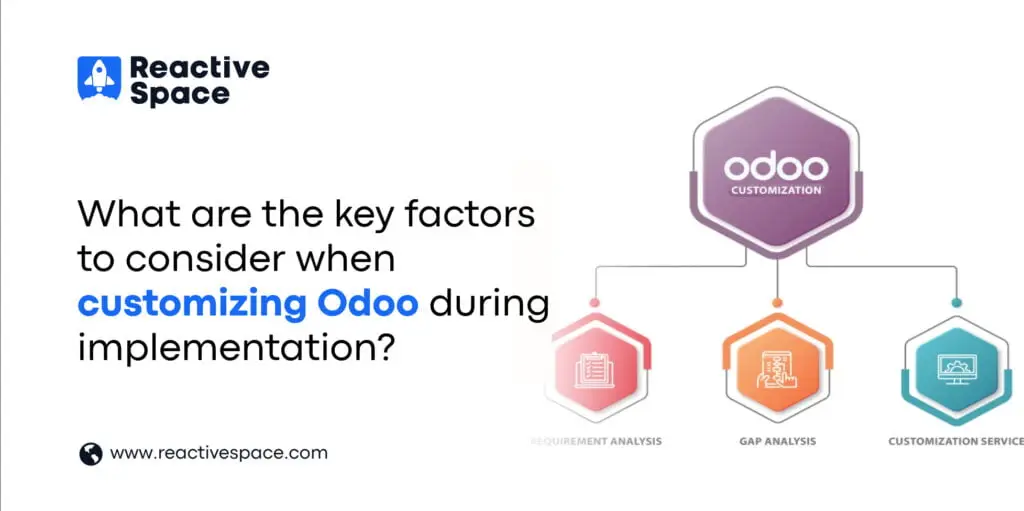
Implementing Odoo, an open-source ERP system, can significantly enhance business operations. However, to fully use its capabilities, customization during implementation is necessary. Customizing Odoo ensures that the software aligns perfectly with your specific business needs, workflows, and processes. Here are the key factors to consider when customizing Odoo during implementation.
What is Odoo?
Odoo is a powerful, open-source software that helps businesses manage and improve their various operations. It offers a wide range of applications for different business tasks, and its modular design allows companies to use only the parts they need. This makes Odoo a flexible and scalable solution for businesses of any size.
Understanding Business Requirements
When implementing Odoo, an open-source ERP system, understanding your business requirements is crucial. This ensures the system fits your company’s specific needs and goals. Here are the key factors to consider when gathering and understanding business requirements for Odoo implementation:
Comprehensive Requirement Analysis
Before starting customization, thoroughly analyze your business needs. Identify key processes that need improvement and the specific features your business requires. Engage with different stakeholders to gather detailed requirements.
Prioritizing Features
Not all features and customizations need to be implemented right away. Prioritize based on their impact on business operations, ease of implementation, and cost. This approach helps manage resources effectively and ensures critical functionalities are addressed first.
System Scalability
Ensuring system scalability is essential when implementing Odoo, especially for businesses expecting growth and changing needs. Scalability means the ERP system can manage increased workloads, larger data volumes, and new features as the business grows. Here are the key considerations for system scalability in Odoo implementation:
Future Proofing
Consider your future business growth and scalability when customizing Odoo. Ensure that the customizations can handle increased data volumes, additional users, and expanded functionalities as your business grows.
Modular Customizations
Opt for modular customizations that can be easily extended or modified in the future. This approach allows for flexibility and scalability, making it easier to adapt the system as business needs evolve.
User Experience
User experience (UX) is important when customizing Odoo to ensure the system is easy to use and meets the needs of your team. Here are key considerations for enhancing user experience in Odoo implementation:
User-Friendly Interface
Customizations should enhance the user experience by simplifying workflows and making the interface intuitive. Involve end-users in the customization process to gather feedback and ensure the changes meet their needs.
Training and Support
Customized features may require additional training for users. Plan for comprehensive training sessions and create detailed documentation to ensure a smooth transition and effective use of the new features.
Integration with Other Systems
Integration with other systems is essential for maximizing the efficiency and effectiveness of your Odoo implementation. Here are key considerations for integrating Odoo with other systems:
Seamless Integration
Consider how Odoo will integrate with other existing systems, like CRM, e-commerce platforms, or third-party applications. Make sure the customizations allow smooth data exchange and process synchronization between Odoo and these systems.
API and Middleware
Utilize Odoo’s robust API capabilities and middleware solutions to create seamless integrations. This approach helps in maintaining data consistency and improving operational efficiency.
Customization Budget
Setting a budget for customization is an important step in your Odoo implementation process. Here’s why it matters and how to go about it:
Cost Analysis
Customizations can be costly. Perform a detailed cost analysis to understand the financial implications of the customizations. Consider both the initial implementation costs and ongoing maintenance expenses.
Budget Management
Allocate a realistic budget for the customization process. Ensure that there are contingency funds available for unexpected expenses or additional customizations that may arise during implementation.
Technical Expertise
Technical expertise plays a vital role in the successful implementation and customization of Odoo. Here’s why it’s important and how to ensure you have the right expertise:
Skilled Development Team
The success of Odoo customization heavily relies on the expertise of the development team. Engage experienced Odoo developers who have a deep understanding of the platform and its capabilities.
Quality Assurance
Implement robust quality assurance processes to test customizations thoroughly. This includes functional testing, performance testing, and user acceptance testing to ensure that the customizations work as intended and do not introduce new issues.
Regulatory Compliance
Regulatory compliance is an essential aspect of Odoo implementation, especially for businesses operating in regulated industries. Here’s why it’s important and how to ensure compliance:
Data Security and Privacy
Ensure that the customizations comply with data security and privacy regulations relevant to your industry. Implement necessary security measures to protect sensitive business data and customer information.
Compliance with Industry Standards
Customizations should also adhere to industry-specific regulations and standards. This ensures that your business remains compliant and avoids potential legal issues.
Maintenance and Support
Maintenance and support are crucial aspects of Odoo implementation to ensure the system’s continued functionality, efficiency, and relevance. Here’s why they matter and how to approach them:
Ongoing Support
Plan for ongoing support and maintenance for the customized features. This includes regular updates, bug fixes, and performance optimizations to keep the system running smoothly.
Documentation
Create detailed documentation for all customizations. This helps in future maintenance, troubleshooting, and onboarding of new users or developers.
Conclusion
Customizing Odoo during implementation can make it a powerful tool designed specifically for your business. By keeping these important factors in mind like understanding your business needs, making sure it can grow with your business, making it easy for people to use, connecting it with other systems you use, managing your budget well, getting help from experts, following rules and regulations, and planning to keep it running smoothly you can make sure your Odoo setup is successful and works well for your business. This smart approach not only helps you get the most out of Odoo but also sets your business up for long-term success and efficiency.
Unlock Your Business Potential with Custom Odoo Solutions
Transform your business processes and gain a competitive edge with Custom Odoo services. Our experienced developers can help you achieve your unique goals.
Get a Free Consultation Now


